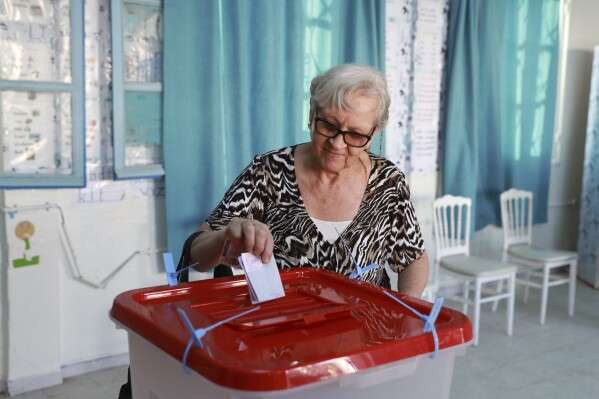Tunisian President Kais Saied is waiting for official results before declaring victory in Sunday’s election, though exit polls show him winning by an overwhelming margin.
Despite the celebrations among his supporters, the election has been overshadowed by the arrests of key opposition figures, leading to widespread criticism.
As the results rolled in, President Saied’s supporters filled the streets, honking car horns and celebrating after voting ended. Public television showed the president addressing the nation, pledging to continue his campaign against corruption, much like he has throughout his presidency.
“We’re going to cleanse the country of all the corrupt and schemers,” Saied declared at his campaign headquarters, a sentiment that has defined his tenure. He vowed to root out what he described as “traitors” who have undermined Tunisia.
According to exit polls from Sigma Conseil, an independent firm known for accurate predictions, Saied secured over 89% of the vote. His main competitors included imprisoned businessman Ayachi Zammel and Zouhair Maghzaoui, a leftist politician who initially supported Saied but later ran against him.
However, this election was far from a display of democracy, according to critics. Much opposition, including journalists, lawyers, and civil society leaders, boycotted the election, branding it a sham.
They pointed to the arrest of Saied’s main political rivals, saying the president had ensured there was little competition. With many of his critics behind bars, the election’s legitimacy has come under scrutiny.
Official results are expected on Monday, but the low voter turnout adds to the controversy. Only 2.7 million people, or 27.7% of the electorate, cast their ballots, a sharp drop from the 49% turnout in Tunisia’s previous presidential race in 2019. Opponents argue that this low participation reflects a lack of faith in the process.

Supporters of Saied, however, argue that the low turnout reflects the frustration Tunisians feel with the political class that governed before his rise to power.
Layla Baccouchi, a vocal supporter, said the president’s anticipated second term would send a clear message that the old political system was no longer acceptable. “We’re tired of the governance we had before. We want a leader who wants to work for Tunisia. This country was on the road to ruin,” she said.
The election marks Tunisia’s third presidential race since it became the epicenter of the Arab Spring uprisings in 2011. The movement, which toppled long-standing dictators across the Middle East and North Africa, began in Tunisia after a fruit vendor set himself on fire in protest of police corruption and abuse. The uprising led to the ousting of President Zine El Abidine Ben Ali, who fled the country.
In the years following the revolution, Tunisia took major steps toward democracy, adopting a new constitution and establishing a Truth and Dignity Commission to investigate abuses under the previous regime.
Tunisia’s leading civil society groups even won the Nobel Peace Prize for brokering political compromise. However, the country has struggled with political instability and a weak economy ever since, leaving many Tunisians disillusioned with their leaders.
Election Marred by Arrests and Boycotts
While Tunisia’s first two post-Arab Spring elections were widely seen as free and fair, this year’s race has been tainted by the arrests of Saied’s most vocal critics. Right-wing and Islamist opponents, including Zammel, were arrested ahead of the vote, with Zammel sentenced to prison for violating election laws.
Saied’s new constitution, passed by referendum, allows the president to appoint members of the election commission, ISIE. The commission has come under fire for rejecting several candidates and ignoring court orders to reinstate them on the ballot. Election monitors were also denied permission to observe the polls, adding to concerns over the transparency of the process.
Many Tunisians, like 27-year-old Siwar Gmati of the NGO I Watch, chose to boycott the election in protest of these irregularities. “This is not the democracy we fought for,” Gmati said, reflecting the sentiment of many in the country.
READ ALSO: Bright Simons Attributes Galamsey Menace to Inadequate Regulatory Oversight




















